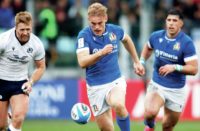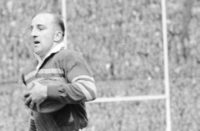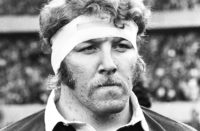 There used to be a time when Wales-England matches required a heavier police presence on the field than off it, when the boys in blue turned out in red and white for a bit of mayhem.
There used to be a time when Wales-England matches required a heavier police presence on the field than off it, when the boys in blue turned out in red and white for a bit of mayhem.
Their collective propensity for breaking the law as opposed to enforcing it was never more graphically illustrated than during the Eighties and one match in particular. One of the more uproarious scraps resulted in one English police officer being admonished by his chief constable for putting a Welsh police officer in hospital.
The same match, at Cardiff Arms Park a quarter of a century ago, claimed a third police victim, the Wales lock Steve Sutton. The RFU suspended four players for their behaviour, including one from the Lancashire Constabulary, Wade Dooley whose punching of Phil Davies fractured the Welsh No. 8's cheekbone.
Anglo-Welsh skirmishes in those days also featured other policemen from other forces, major forwards like Dean Richards, Martin Bayfield and Paul Ackford for England as well as the occasional back, like the Orrell wing Nigel Heslop. Wales, too, had a fine helmeted bevy of coppers at their disposal – Richie Collins, Martyn Morris, Rowland Phillips, Hugh Williams-Jones, John Wakeford and Bleddyn Bowen to name but six.
All of them, as well as the capped centres Ian Hall and Ritchie Donovan, played for the South Wales Police in the unofficial Welsh club championship during the days before the old game got round to making leagues official. A trip to the force's Bridgend headquarters and their ground at Waterton Cross was not for the faint-hearted.
What, you may wonder, has all this got to do with the price of fish? Amid all the national gnashing of teeth over the Argentinian flop it would have been easy to miss one of the sadder events of the season, one which will raise fresh questions over what is happening to the game at grass-roots level.
The passing of the South Wales Police RFC went almost unannounced. The club has ceased to be, certainly as a competitive force having withdrawn from Division 5 (South Central) of the WRU League because they can no longer raise a team. The obituary notice went largely unnoticed.
“It is with regret that I have to announce that South Wales Police RFC will, for the 2012-13 season, withdraw from the WRU League competitions at both senior and youth level,” club chairman Nic Lanagan stated on the club's website. “This has been forced on the club by a lack of players. Despite the best efforts of a limited number of dedicated individuals we have been unable to guarantee that we would have sufficient resources to last the season.”
Their demise has saddened the old players like Sutton who retired in September at 54 after a life-time in the South Wales force, having joined from Pontypool more than 30 years ago. “It's very, very sad to see it like this and in that respect it's similar to Pontypool's decline,” he said. “I'm not really that surprised. The club hadn't been going well for several years. I know they tried very hard to keep it going but they just couldn't get enough numbers and that was it.
“We used to have a tremendous turn-out for the bigger matches back in the Eighties – 3,500, maybe more, on special occasions. The South Wales Police rugby club was bopping at the time. Sadly, it went from that to two men and a dog.
“I owe a lot to the South Wales Police, to people like the chief constable, David Vaughan, and other chief constables before him. Joining them was the best move of my career. I have a lot to thank them for and I thoroughly enjoyed my time.
“After ten years, I moved to the dog section and became an instructor, training dogs like Labradors and Spaniels to sniff out explosives. I trained over 50 dogs across the whole country and now that I'm not long retired, I miss them.”
The most talked-about of his nine matches for Wales was the one against England on March 7, 1987. Ray Megson, the Scottish referee in charge of his first international, failed hopelessly to impose any sort of authority before or after the incident which led to England banning Dooley for the next match along with Gareth Chilcott, Graham Dawe and scrum-half Richard Hill, the captain.
Dooley has never forgotten how, in a quiet moment following the after-match dinner, Sutton invited him for a drink at a time when the ‘Blackpool Tower' must have felt like Public Enemy No. 1. “I played with and against Wade many times for the Welsh Police and the British Police,' Sutton said. ‘So I got to know him as a nice chap.
“That night I went across to him and had a chat. I didn't say: ‘What a cracking punch that was, Wade.' I could sense then that he regretted it but things like that happened in rugby matches all the time, especially in those days.
“He certainly didn't mean to smash Phil Davies' cheekbone. Just after that happened Bob Norster, who was playing alongside me in the second row, flung his elbow out and caught me smack in the face just as I was getting off the ground. So I had my nose broken accidentally. Well, Bob said it was accidental…”

























